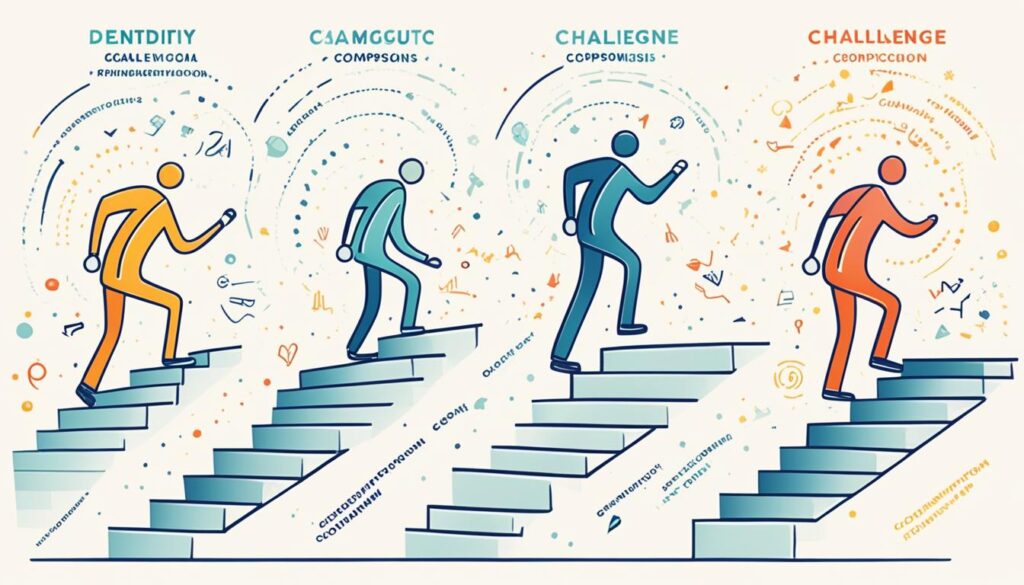Achieve Your CBT Goals for Personal Growth

Are you struggling to make progress in your personal growth journey? Do you find it challenging to stay motivated and focused on your goals? If so, you’re not alone. Many individuals face these obstacles when seeking to achieve personal growth and well-being. However, there is a powerful tool that can help you overcome these challenges and pave the way to success: Cognitive Behavioral Therapy (CBT) goals.
In this article, we will explore the importance of goal setting in CBT and how it can be a game-changer in your personal growth journey. We will delve into the benefits of setting goals, the key principles of SMART goal setting in CBT, and practical tips to help you set and achieve your goals effectively. So, if you’re ready to take your personal growth to new heights, let’s dive in!
Key Takeaways:
- Goal setting is essential in CBT for personal growth and well-being.
- Setting clear, attainable goals helps you stay motivated and committed to therapy.
- SMART goals in CBT are specific, measurable, achievable, realistic, and time-bound.
- Aligning your goals with personal values enhances the meaning and satisfaction of your accomplishments.
- Monitoring progress and celebrating successes are crucial for maintaining motivation and commitment.
The Benefits of Goal Setting in CBT
Goal setting is a fundamental aspect of Cognitive Behavioral Therapy (CBT) that offers numerous benefits for personal growth and well-being. When you set goals in CBT, you create a roadmap for your journey towards positive change and transformation.
Effective goal setting in CBT can lead to:
- Improved motivation and commitment
- Enhanced focus and clarity
- Better understanding of your personal values
- A boost in self-confidence and self-efficacy
When you set specific goals aligned with your values, it becomes easier to stay motivated and focused on your desired outcomes. You gain a deeper understanding of what truly matters to you, which helps you stay committed to the therapeutic process.
Furthermore, setting goals in CBT enables you to acquire a better understanding of your values and how they influence your thoughts, emotions, and behaviors. By aligning your goals with your core values, you can experience meaningful improvement and greater satisfaction in your accomplishments.
Additionally, setting goals in CBT enhances self-confidence and self-efficacy. As you achieve each goal, your confidence grows, and you develop a belief in your ability to overcome challenges and make positive changes in your life.
Benefits of Goal Setting in CBT
| Benefits |
|---|
| Improved motivation and commitment |
| Enhanced focus and clarity |
| Better understanding of personal values |
| Boost in self-confidence and self-efficacy |
Benefits of Goal Setting in CBT
| Benefits |
|---|
| Improved motivation and commitment |
| Enhanced focus and clarity |
| Better understanding of personal values |
| Boost in self-confidence and self-efficacy |

Setting SMART Goals in CBT
In Cognitive Behavioral Therapy (CBT), goal setting is a crucial step towards personal growth and behavioral change. To ensure effective goal setting, it is important to follow the SMART criteria:
- Specific: Set clear and well-defined goals that focus on a specific outcome. Specify what you want to achieve in detail.
- Measurable: Establish concrete criteria to track your progress and measure your success. Define how you will measure your goal attainment.
- Achievable: Set goals that are realistic and attainable within your capabilities and resources. Choose goals that challenge you but are within reach.
- Realistic: Ensure that your goals align with your abilities, values, and priorities. Consider the feasibility of your goals in relation to your current circumstances.
- Time-bound: Set a specified time frame or deadline for achieving your goals. Having a timeframe promotes motivation and helps you stay focused.
By adhering to the SMART criteria, you can create goals that are well-defined, trackable, attainable, relevant to your needs and values, and have a deadline for motivation. Let’s look at an example:
Example: Setting a SMART Goal
Goal: Improve sleep quality
| SMART Criteria | Goal Example |
|---|---|
| Specific | Improve sleep quality by reducing nighttime distractions |
| Measurable | Track sleep quality using a sleep diary or a sleep tracking device |
| Achievable | Avoid screen time before bed and create a calm bedtime routine |
| Realistic | Adjust bedtime to allow for a sufficient amount of sleep |
| Time-bound | Improve sleep quality within the next three weeks |
In this example, the goal is specific, measurable, achievable, realistic, and time-bound. By implementing strategies to reduce nighttime distractions, track sleep quality, create a calming bedtime routine, and adjust bedtime, the individual can work towards improving their sleep quality within a specific timeframe.

Goal Setting Tips for CBT
In order to effectively set and achieve goals in Cognitive Behavioral Therapy (CBT), it is important to follow some key tips and strategies. By working with a CBT therapist, you can establish personalized objectives that align with your values and aspirations. Breaking down long-term goals into smaller, more manageable steps is another helpful approach to ensure progress and motivation.
Regularly reviewing and revising your goals is essential in order to stay on track and make any necessary adjustments. This allows for continuous improvement and adaptation as you progress through therapy. Additionally, monitoring your progress along the way provides valuable insights and helps you stay accountable.
Another important aspect of goal setting in CBT is celebrating success. Recognizing and acknowledging your achievements, no matter how small, can be highly motivating and boost your confidence. By celebrating your milestones, you reinforce positive behavior and create a sense of accomplishment.
Remember to align your goals with your personal values and aspirations. This ensures that your goals are meaningful and relevant to you, making them more compelling and driving you towards success. By setting personalized objectives, breaking down goals, reviewing and revising them, monitoring progress, and celebrating success, you can maximize the effectiveness of goal setting in CBT.
Now let’s take a look at some practical tips and strategies for goal setting in CBT:
Tips for Goal Setting in CBT:
- Collaborate with a CBT therapist to establish personalized objectives that align with your values and aspirations.
- Break down long-term goals into smaller, more manageable steps to maintain motivation and track progress.
- Regularly review and revise your goals to ensure they remain relevant and adaptable throughout your therapeutic journey.
- Monitor your progress by keeping track of your achievements and reflecting on your growth.
- Set aside time to celebrate your successes, no matter how small, to boost your motivation and reinforce positive behavior.
By implementing these goal setting tips in your CBT therapy, you can enhance your progress, stay motivated, and achieve meaningful change.

Monitoring Progress and Celebrating Success
Tracking your progress and celebrating your accomplishments are vital for maintaining motivation and commitment throughout your therapy journey. By actively monitoring your progress, you can stay engaged and motivated as you work towards your goals. Additionally, taking the time to reflect on setbacks and recognize your victories will help you stay focused and encouraged.
Journaling and Reflecting
One effective way to track your progress is through journaling. Take the time to write down your thoughts, emotions, and experiences during your therapy sessions. This can help you gain deeper insights into your progress, setbacks, and victories. By reflecting on your journal entries, you can identify patterns, challenges, and growth opportunities.
Creating Checklists and Progress Charts
Checklists and progress charts provide visual representations of your goals and achievements. Create a checklist of small tasks or milestones to mark your progress along the way. As you complete each item on the checklist, you’ll have a clear sense of accomplishment. Progress charts, on the other hand, help you visualize your overall progress over time. Whether it’s a line graph, bar graph, or any other visual representation, seeing your progress visually can be incredibly motivating.
Reflecting on Setbacks and Learning from Them
Setbacks are a natural part of the therapy journey. Embrace them as opportunities for growth and learning. Take the time to reflect on setbacks, identify any underlying patterns or triggers, and develop strategies for overcoming them. Remember, setbacks are not indicators of failure but important stepping stones towards personal growth.
Recognizing and Celebrating Victories
Don’t forget to acknowledge and celebrate your victories, no matter how big or small they may seem. Recognizing the progress you have made will boost your confidence and reinforce your motivation to continue working towards your goals. Celebrate your achievements by treating yourself to something you enjoy or sharing your success with a trusted friend or loved one.
Remember, tracking progress, reflecting on setbacks, and celebrating victories are all integral parts of your therapy journey. They will help you stay motivated, focused, and committed to achieving your goals. Embrace these practices and watch as they contribute to your personal growth and well-being.
What is Cognitive Behavioral Therapy?
Cognitive Behavioral Therapy (CBT) is a well-researched and effective form of psychotherapy that focuses on the connection between thoughts, emotions, and behaviors. By understanding how these three aspects interact, CBT helps individuals recognize and modify unhelpful patterns of thinking and behavior.
Cognitive Behavioral Therapy aims to empower individuals with the tools and strategies to overcome various mental health challenges and improve their overall well-being. It is a collaborative approach that involves both the therapist and the client working together to identify and change problematic thoughts and behaviors.
At the core of Cognitive Behavioral Therapy is the belief that our thoughts, emotions, and behaviors are intertwined. Negative thoughts and distorted beliefs can lead to negative emotions and ultimately result in maladaptive behaviors. By addressing and challenging these negative thoughts, CBT helps individuals develop healthier and more adaptive ways of thinking and behaving.
In a therapeutic setting, a CBT therapist will work with the client to identify specific goals and create a treatment plan tailored to their unique needs. The goal is to help individuals gain insight into their thoughts and emotions and develop new coping strategies. Through regular therapy sessions and practice outside of therapy, clients can learn to recognize and change unhelpful thought patterns, manage their emotions, and make positive changes in their behavior.
Overall, Cognitive Behavioral Therapy provides individuals with the tools and skills necessary to navigate life’s challenges and improve their quality of life. By working on the connection between thoughts, emotions, and behaviors, CBT fosters personal growth and empowers individuals to lead more fulfilling lives.

| Key Components of CBT | Benefits of CBT |
|---|---|
|
|
CBT Exercises for Personal Growth
Personal growth is at the core of Cognitive Behavioral Therapy (CBT), and there are various exercises that can help you develop new skills and perspectives. These exercises foster self-reflection, enhance self-awareness, and promote adaptive thinking to support your journey towards personal growth.
1. Cognitive Restructuring
Challenging negative thoughts is a key component of CBT. Through cognitive restructuring exercises, you can learn to identify and challenge irrational or unhelpful thoughts that contribute to negative emotions and behaviors. By replacing negative thoughts with more balanced and realistic ones, you can cultivate a more positive mindset.
2. Behavioral Activation
Behavioral activation exercises focus on setting goals and taking action to overcome obstacles and improve your mood. By engaging in activities that are aligned with your values and bring you joy, you can enhance your motivation, boost your mood, and increase your overall well-being.
3. Developing Coping Skills
CBT exercises also involve acquiring and strengthening coping skills to manage challenging situations more effectively. These skills may include stress management techniques, problem-solving strategies, assertiveness training, and relaxation techniques. By developing these skills, you can build resilience and better cope with life’s challenges.
4. Enhancing Self-Awareness
Self-awareness exercises in CBT help you explore your thoughts, emotions, and behaviors more deeply. By gaining insight into your patterns and triggers, you can better understand yourself and make conscious choices for personal growth. Journaling, mindfulness practices, and reflection exercises are examples of activities that enhance self-awareness.
5. Cultivating Mindfulness
Mindfulness exercises are integral to CBT and involve developing a present-moment, non-judgmental awareness of your thoughts, feelings, and sensations. These exercises help you observe your inner experiences without attachment or reactivity, leading to increased self-acceptance, emotional regulation, and overall well-being.
Remember, as you engage in these CBT exercises, it’s essential to be consistent, patient, and compassionate with yourself. Personal growth is a gradual process, and with commitment and practice, you can experience transformative change.
Conclusion
Goal setting in Cognitive Behavioral Therapy (CBT) is a vital tool for personal growth and achieving long-term behavioral change. By setting clear and attainable goals that align with your personal values and following the SMART criteria, you can experience improved motivation, enhanced focus, and a boost in self-confidence. Monitoring your progress, regularly revising your goals, and celebrating your successes along the way are crucial for maintaining motivation and commitment to your goals.
CBT exercises, such as cognitive restructuring and behavioral activation, can further support your personal growth and overall well-being. Cognitive restructuring helps you challenge negative thoughts and replace them with more positive and realistic ones, while behavioral activation encourages you to set goals and take active steps towards achieving them. By engaging in these exercises and developing coping skills, enhancing self-awareness, and cultivating mindfulness, you can cultivate a greater sense of self-empowerment and achieve personal growth.
Remember, in CBT, goal setting provides direction and focus to therapy, allowing you to stay motivated, clarify your objectives, and build self-confidence. As you embark on your journey of personal growth, take the time to set specific, measurable, achievable, realistic, and time-bound goals. Stay committed to monitoring your progress, making necessary adjustments, and celebrating your achievements. With CBT and goal setting, you have the power to transform your life and achieve the growth and fulfillment you desire.






